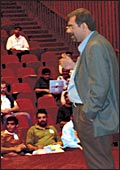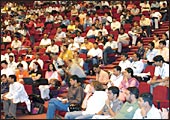 |
| Tech jamboree: India has the largest
community of open source developers but large businesses are
still wary of free software |
|
|
|
Atul Chitnis
|
24 NOVEMBER,
10.30 A.M.
National Science Seminar Complex, Bangalore
It
is already 30 minutes past the scheduled start, but there are
few signs of any activity on stage for the sixth edition of India's
largest free and open source symposium, foss.in. While the gates
were opened at 8 a.m., veterans of the event seem to have read
the situation perfectly, sauntering in 10 minutes before the scheduled
start and forming a winding queue that extends all the way to
the busy C.V. Raman Road outside. Inside the 950-seater auditorium,
delegates are just beginning to find their places and firing up
their laptops to take notes on the fly and tweak their presentations
in the last minute. Six years after the event was first held in
Bangalore, little seems to have changed about the look-and-feel
of foss.in. Attendees are almost exclusively open source and free
software code-jocks and unlike dozens of other academic and business
conferences hosted at this centre, there's an air of informality
around this one.
"We are for, of and by the open source
community," Atul Chitnis, the man behind this event and the
founder of Exocore Consulting, a Bangalore-based open source solutions
vendor, says in his opening remarks, when the event finally gets
rolling, nearly an hour behind schedule. As always, there are
sharp jibes at enemy #1 Microsoft (revolving around their platforms
and software such as .Net and Windows), but despite the growth
of open source in India (with even state administrations such
as Kerala plumping for it), there are few signs that the scope
of this event has changed. The keynote address, this time around
by Suparna Bhattacharya, from IBM India, is packed with some 30
slides of tech jargon and has end-users and the plain curious
fleeing for the exits. "Keynotes need to be more broad based
and thematic," one such attendee tells this writer as he
seeks refuge at the snacks stall.
Chitnis argues that "having a recognised
and respected Indian developer (Suparna Bhattacharya) doing the
opening keynote to a standing ovation, and the subsequent positive
reactions, was a massive achievement". He claims that as
a result of this re-orientation, many new projects have been started
and more people are showing interest in the free software movement.
The interest from a techie's standpoint is evident from the line
of white tent just behind the main auditorium, where people set
up on-the-spot discussion boards and projects.
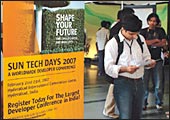 |
| Enemy #1: It's Microsoft for them |
General users of Linux and other open source
offerings are, however, clearly aggrieved with the schedule offering
attendees a technology-intensive programme, filled with sessions
on Linux and Art of Minimalist Development by IBM's Bhattacharya,
Using Gentoo Portage to Build a Sandboxed Application Stack and
complete geek-speak talks on The TFRC Tunnel Protocol-an XFRM-based
tunnel driver for Linux 2.6. "There are numerous other events
around India all year round (for example, Freedel in Delhi or
Gnunify in Pune) and user groups that already cater to newcomers
and advocacy," contends Chitnis.
In between this blizzard of technology talks,
there are actually some more generic presentations on bridging
the digital divide using free software and more expectedly a vitriolic
attack on the existing model by Christoff Wittig, founder and
CEO of db4 objects, who attacks the current model for "stifling
innovation" and arguing that well-oiled open source projects
can actually earn money. Over the last few months, state governments,
most notably Kerala, have made a very public pitch for open source
software products, at the expense of Microsoft.
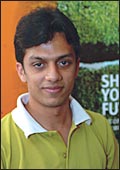 |
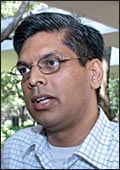 |
This engineering student
has put an operating system on a pen drive
Anil Gulecha, a student at the JSS Academy |
"India offers us
the largest communities of open-source proficient techies"
Gajanana Hegde
VP, SpikeSource |
The intense technology focus, however, takes
its toll on the total number of participants (down to 2,000 compared
to over 3,000 a year ago) as well as the range of participants
for this event. "This was intentional-we refocussed the event
to increase both the quality of talks and the interaction between
people at the event," says Chitnis. The event is an ideal
platform for some companies such as Sun Microsystems and SpikeSource
to advertise their products. "We believe that India offers
us one of the largest communities of open-source proficient techies
globally," says SpikeSource's Vice President Gajanana Hegde.
Others such as Anil Gulecha, a third year engineering student
at the JSS Academy, Bangalore, also use this opportunity to show
off the BeleniX operating system on a thumb drive. "You can
now download the entire BeleniX OS onto your thumb drive and use
it anywhere," says Gulecha about his first open source project.
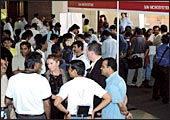 |
| Free world: Die-hard open source believers
schmooze |
Rather than target large companies with Linux
and other open source software (and application based on it),
SpikeSource's Hegde says that small businesses are adopting Linux
and Linux-based solutions because they no longer have to pay for
the hefty licence fee Microsoft demands. "This is a good
carrot for them to save some costs... When you are 50-100 people,
you don't want to spend your whole budget just on it," he
argues. Aside from being unable to afford expensive licence fees,
using Linux and other open source technologies means that there's
a much larger pool of technical help at hand if a bug had to be
fixed. "Most of these companies can't afford to spend on
large teams for support and maintenance, but open source communities
can be approached anywhere to fix a bug," says Hegde.
While large corporates are already locked
into dominant closed offerings from the likes of Microsoft, open
source votaries argue that the booming 2.5 lakh strong SMB market
may just hold the key to the Indian market. "The small and
medium business (SMB) segment registered a strong double-digit
growth in pc shipments," says Piyush Pushkal, Assistant Manager,
pc Research IDC India.
While Bangalore became a beehive of open
source activity for three days in late October, it remains to
be seen if Chitnis & Co. can persuade computer users to dump
Microsoft for open source.
|






